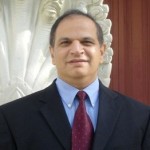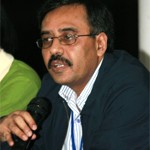
15 Aug, 2012
ASEAN Religious, Cultural Harmony As Critical As Economic Integration – Prof Yusuf
Bangkok – The religious and cultural heritage of ASEAN countries is one of its major tourism assets. Ways to safeguard it from becoming a social and geopolitical liability will be discussed at a seminar on religious pluralism in ASEAN to be organised for the first time at Assumption University in Bangkok between Aug 23-24.
Funded by the Konrad Adenauer Foundation, the seminar will bring together distinguished academics from Thailand and the ASEAN countries to advance the cause of Interfaith Dialogue and Religious Pluralism.
| For full details of the seminar, click here. |
| Free admission. |
According to the seminar coordinator, Prof Dr Imtiyaz Yusuf (pictured left) of the Graduate School of Philosophy and Religion, Assumption University, “The real importance of ASEAN integration will go well beyond economic and trade issues. In terms of religious profile, 42% of the total  population of ASEAN will be Muslim, 40% will be Buddhist and the rest divided among Christian and other religious minorities.
population of ASEAN will be Muslim, 40% will be Buddhist and the rest divided among Christian and other religious minorities.
“Southeast Asian countries are known for their semi-secular, multi-religious and multi-cultural identities. These are reflected in the many historic monuments and religious spots throughout ASEAN and Asia.
“Although this is a major asset in terms of tourism promotion, it is also one of the main factors fuelling ethno-religious tensions and conflicts in Southeast Asia, as some recent events have clearly shown.
“The state of interreligious relationship in ASEAN countries until now has been that of “live and let live” but this approach will become insufficient as the ASEAN countries become a community as of 2015 onwards.”
| Travel Impact Newswire dispatches are the result of hard work and dedication. |
| They are free of boring press releases and simplistic interviews. |
| Rather, they feature alternative perspectives, raises important issues and challenge conventional wisdoms. |
| If you think the effort is worthwhile and deserves to be continued, click here. |
According to Dr Yusuf, “One important challenge before ASEAN will be to form a culture of religious pluralism which will help in resolving and reducing conflicts and aid in developing religious tolerance and cooperation in and between ASEAN countries both internally and externally.”
He said that policymakers in the tourism sector as well as in international relations can no longer exclude religious and cultural factors and their broader implications for peace, security and stability. “No country is immune from biases and prejudices and the threat of divide and rule policies being used by external and internal players to serve their own ends.”
Among the topics to be discussed are: Religious Pluralism in History; Religious Pluralism in ASEAN community; The Problem of Religious Diversity; Beyond Tolerance of Religious Diversity in ASEAN; Religious Pluralism and Democracy; Threats to Religious Identity; and the Role Of Media In Promotion Of Religious Pluralism.
The proceedings will later be developed into a book.
Indeed, the importance of the seminar was underscored when Pakistani Ambassador to Thailand, Mr. Sohail Mahmood, (pictured left) highlighted these very same issues in remarks at an Iftar dinner hosted by Thai Prime Minister  Yingluck Shinawatra on July 31. Iftar is the evening break-of-fast meal taken by Muslims during the month of Ramadan.
Yingluck Shinawatra on July 31. Iftar is the evening break-of-fast meal taken by Muslims during the month of Ramadan.
Asked to speak on behalf of the Muslim diplomatic community in Thailand, the Ambassador noted that the annual hosting of an Iftar dinner by the Thai Prime Minister every year is itself “a thoughtful gesture (which) symbolizes the profound respect in which the Royal Thai Government holds the beliefs of the Muslim community.”
The presence of the senior members of government, the elected representatives of Thai Muslims, and the religious figures and community leaders from various parts of Thailand adds to the stature and credibility of this occasion, the Ambassador said.
He added, “Given the significance of tonight’s event, there are three key messages that I wish to share:
“First, we all must pool our strengths to promote inter-faith harmony. From time to time, there are attempts to distort the teachings of these great religions (Buddhism and Islam), with a view to creating misunderstandings or sowing discord. It is, therefore, incumbent upon people of goodwill in all faiths to fight distortion and intolerance, to emphasis our common humanity, and to seek common ground for fostering better mutual understanding and promoting inter-faith harmony.
“Second, Thailand’s multi-culturalism is a great strength that must continue to be cherished and nurtured. Thailand is like a beautiful mosaic. And Thai Muslims have played an important part in enriching it. Their contribution to Thai economy and society is ever growing.
“Thailand takes justifiable pride in the fact that both the Buddhist and Muslim communities have co-existed, in peace and harmony, for centuries. This is a precious legacy, and every one must do their part to preserve it and to pass it on to the succeeding generations.
“As friends and well-wishers of Thailand, we earnestly wish and pray that both major communities will continue to work together and make their valuable contributions to the economic, political and social development of Thailand.
“Third, Thailand and the Muslim world must forge a strong partnership of mutual benefit. We are cognizant that Thailand is committed to deeper engagement with the Muslim world and is desirous of enhanced cooperation with the Organisation of Islamic Cooperation.
“We, the Muslim envoys, share this worthy objective and are committed to work as equal partners to advance it. Tonight, we reaffirm this commitment.”
Mr. Mahmood noted that the Iftar dinner was being held just one day before Thailand took “a far-reaching step” – the establishment of diplomatic relations with the State of Palestine at the ambassadorial level.
“We congratulate the Royal Thai Government on this decision and extend our best wishes for the future growth of this new and important relationship,” the Ambassador said.
See also:
Imtiaz Muqbil’s Opening Remarks, Int’l Luxury Travel Mart, Cannes, Dec 4, 2006
Imtiaz Muqbil’s Speech at the First UNWTO Conference on Tourism, Religions and Dialogue of Cultures
Imtiaz Muqbil’s TEDx Talk: How the World Can Attain “Peace Through Tourism”
Journey of a Lifetime: In The Footsteps of the Buddha
Int’l Day of Prayer for Peace – 21 Sept
The following report on the same subject was prepared by Imtiaz Muqbil for the UN World Tourism Organisation in January 2010 and submitted to the ASEAN Secretariat which, unfortunately, ignored it. Click here to download the report: UNWTO REPORT on ASEAN Tourism Integration



Liked this article? Share it!